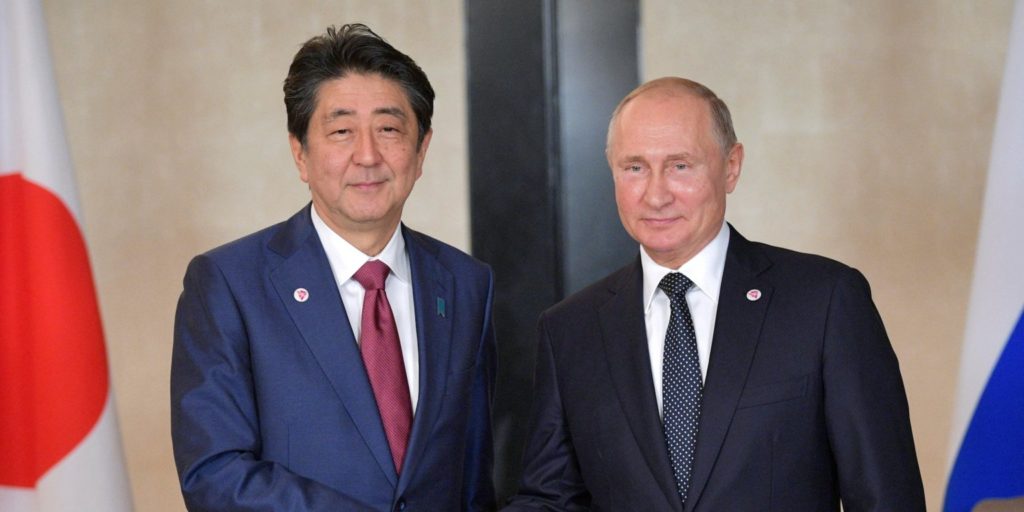Japan’s Abe Tells Putin He Won’t Let US Troops on Long-Disputed Islands if Russia Returns Them to Japan
ASIA--PACIFIC, 19 Nov 2018
Bill Bostock | Business Insider – TRANSCEND Media Service

Russian President Vladimir Putin, right, and Japanese Prime Minister Shinzo Abe pose for a photo during the ASEAN-Russia Summit in the ongoing 33rd ASEAN Summit and Related Summits, November 14, 2018. AP
- Shinzo Abe told Vladimir Putin the US won’t be allowed to build military bases on four disputed Russian islands if they’re given back to Japan.
- The islands were taken by the Soviet Union in 1945 and Japan wants them back.
- But post-war agreements between the US and Japan suggest the US can build military bases anywhere on Japanese soil.
- The leaders were talking in Singapore on Wednesday and both committed to resolving the issue, the Asahi Shimbun reported.
16 Nov 2018 – Japanese Prime Minister Shinzo Abe told Vladimir Putin on Wednesday [14 Nov] he won’t let the US build any military bases on a group of long-disputed islands after Russia returns them to Japan.
At a summit in Singapore, Putin and Abe agreed to accelerate talks over Russia’s return of the Southern Kuril islands — four small Russian islands half way between Japan and Russia — and Abe assured Putin no US military troops would get anywhere near there, The Asahi Shimbun reported.
The Southern Kuril islands off the northern Japanese island of Hokkaido were taken by the Soviet Union in 1945 after World War II.
Abe said: “This issue, which has existed for more than 70 years since the end of the war, will be solved by Putin and me, and not left for the next generation. President Putin and I completely shared that strong desire,” Bloomberg reported.
But the post-war agreement between Japan and the US could prove problematic, as the US can seek to build military bases in Japan due to the Japan-US Security Treaty and Japan-US Status of Forces Agreement (SOFA,) the Asahi Shimbun reported.
The agreements say the US has a duty to protect Japan, which includes a prerogative to built military bases.
Wednesday’s talks are late culmination of the 1956 joint-declaration where the Soviet Union promised it would give Japan two of those islands.
The declaration wasn’t a peace treaty though, and Abe has previously said he won’t sign that treaty until the islands are Japanese again, the Associated Press reported.
Abe’s promise on Wednesday is an attempt to sweeten the proposal, but Putin has previously been less forward about the deal.
Russian news agency TASS quoted Putin saying the 1956 declaration “certainly demands separate, additional, and in depth analysis, given that not everything is clear in that Declaration,” Reuters reported, citing TASS.
Abe and Putin are set to meet again on November 30 at a G20 summit in Buenos Aires, Argentina, and when Abe goes to Russia in early 2019.
Abe has said he wants the issue resolved before his tenure ends in 2021, the Asahi Shimbun said.
Japan claims the Soviet Union booted out 17,000 Japanese residents when they took the islands in 1945.
Japanese people call the islands the Northern Territories and Russians call them the Southern Kuriles.
Go to Original – businessinsider.com
DISCLAIMER: The statements, views and opinions expressed in pieces republished here are solely those of the authors and do not necessarily represent those of TMS. In accordance with title 17 U.S.C. section 107, this material is distributed without profit to those who have expressed a prior interest in receiving the included information for research and educational purposes. TMS has no affiliation whatsoever with the originator of this article nor is TMS endorsed or sponsored by the originator. “GO TO ORIGINAL” links are provided as a convenience to our readers and allow for verification of authenticity. However, as originating pages are often updated by their originating host sites, the versions posted may not match the versions our readers view when clicking the “GO TO ORIGINAL” links. This site contains copyrighted material the use of which has not always been specifically authorized by the copyright owner. We are making such material available in our efforts to advance understanding of environmental, political, human rights, economic, democracy, scientific, and social justice issues, etc. We believe this constitutes a ‘fair use’ of any such copyrighted material as provided for in section 107 of the US Copyright Law. In accordance with Title 17 U.S.C. Section 107, the material on this site is distributed without profit to those who have expressed a prior interest in receiving the included information for research and educational purposes. For more information go to: http://www.law.cornell.edu/uscode/17/107.shtml. If you wish to use copyrighted material from this site for purposes of your own that go beyond ‘fair use’, you must obtain permission from the copyright owner.